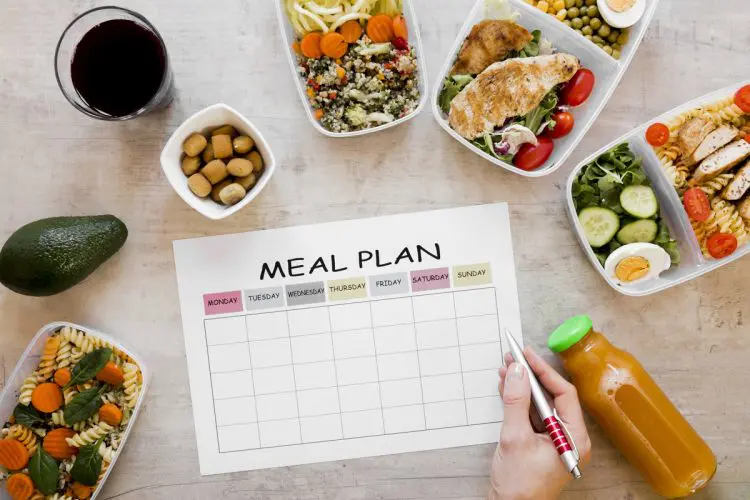Binge eating can mean different things to different people. If Netflix and chilling with a bag of chips is the first thing that comes to your mind when someone mentions binge eating, you probably do not understand its entire scope.
Some people confuse eating too much every once in a while with compulsive eating. They think they have a binge eating problem because they ate one chicken wing too much at a buffet. If you are one of these people, you need to calm down.
According to a study, binge eating disorder (BED) is considered the most common feeding and eating disorder in the United States. BED is one of the most common, but probably the least talked about health issues. We want to change that with this article.
How Binge Eating Turns Into A Disorder
If you have been in the fitness lifestyle long enough, chances are you have come across an article that reads something like “Why you should have cheat days on a fat loss program” or “Why eating that cheeseburger will help you lose weight.”
These articles can be especially fateful for (weak-willed) people on a strict weight loss or lean muscle-building diet.
Usually, the article reasoning goes something like this –
- If you keep depriving your body of cheat meals, your body will eventually stop digesting them, and you might have problems in the future.
- Sub-standard quality carbs can help boost your metabolism as your body has to work extra hard to digest them, and hence eating a cheat meal once a week can help you get shredded.
A dieter who has not tasted a donut in three months usually has tears rolling down his face as he reads these lines. He then virtually high-fives the author and thanks him for his contribution to humankind.
After reading the articles, the individual is convinced that he should (no, must) include cheat meals in his diet two to three times a month to boost his metabolism and burn fat even when he is not physically active.
Must Read: 5 High-Carb Foods To Avoid And Their Healthy Alternatives
The Truth
Deep down inside, every sane individual knows that eating a pizza 3-4 times a week cannot help them lose weight, but they still let their hedonistic side get the better of them. The devil on their shoulder tells them to shut up and savor the new barbecue sauce topping.
The unsuspecting dieter falls for this because he reasons how could one day of overeating do him any harm?
That one cheat meal results in the dieter grocery shopping for pizza bases, burger buns, and their favorite nachos. You probably know what they say about having junk food at home.
Here is a refresher – What is in the cupboard will end up in your stomach.
It is not much after they scrape the bottom of their cupboard that they realize they have zeroed-out their fat loss effort. The truth is, every dieter knows what is waiting for them at the end of their cheat meal honeymoon, they just do not want to believe it.
The Math Behind Cheat Days
While most individuals set a daily macro/calorie diet goal, they forget about the bigger picture. A day’s diet alone – no matter how good (protein-rich) it is – cannot help you transform your physique.
Remember: Diets do not work in isolation.
A day’s worth of diet is a tiny part of your overall transformation program. While you might have a daily calorie goal, what matters is the total amount of calories you will be eating over the 5-6 months of your transformation journey.
For all the smarty pants who still believe that a cheat meal cannot harm their transformation goal, here is some elementary math that might change their mind –
Let’s say you are trying to lose body fat. According to the calorie calculator, your maintenance calories come out to be 2700kcal.
As per your diet coach, you need to be eating 2,200 calories per day to lose one pound of fat weekly. (A 500 calorie deficit can result in one pound of weight loss in a week).
Now, imagine that you read the life-altering cheat meal article on a Friday, decided to turn Saturday into a cheat meal night, and ended up consuming 8,000 calories.
Your hypothetical daily calorie intake chart:
- Monday: 2,200 calories
- Tuesday: 2,200 calories
- Wednesday: 2,200 calories
- Thursday: 2,200 calories
- Friday: 2,200 calories
- Saturday: 8,000 calories
- Sunday: 2,200 calories
Average daily calories: 3,028 kcal (21,200 / 7)
No fitness guru or Instagram fitness celebrity will tell you the truth about cheat meals. Because why waste a fancy #CheatDay post and a possible brand deal?
Coming back to the math, you stuck to your guns for the whole week and only let loose on one day. A single cheat day puts you in a surplus of 828 calories/day (3,028 – 2,200)!
Now imagine that you are on a four-month transformation program, and you discover the cheat meal preaching article in your first week of training.
According to our calculation, you would have eaten 92,736 surplus calories (!) throughout the program.
At the end of the program, if you could not figure out why you did not lose weight even after being on a calorie deficit for 16 weeks, now you know why.
It is like saying, “I was on my way to the Grand Canyon, and I reached halfway in one piece, so I rewarded myself by going a quarter of the way back.” Does this make sense to you? If it does not, your next question should be – Who came up with the cheat day logic?
Related: Find Your Daily Calorie Intake
Binge Eating Disorder Is About More Than Just Food
Don’t you think it is a little odd for someone who eats 2,200 calories/day to throw all his dietary discipline out of the window and gobble down 8,000 calories in a single day?
BED is about more than food, it is a recognized psychological condition. Meaning – someone who ate 8,000 calories in a day did not end up doing it just because he missed tracking his calories. There are underlying psychological factors at play here.
People with binge eating disorder regularly experience episodes of eating unusually large amounts, even when they are not feeling hungry. On top of this, they may feel a strong sense of guilt or shame after a binge eating episode.
Related: 18 Reasons Why You’re Always Hungry
Symptoms of Binge Eating Disorder
Three or more of the following symptoms must be present for a healthcare professional to diagnose BED:
- Eating large amounts without feeling hungry.
- Feelings of guilt or disgust after an eating episode.
- Eating until uncomfortably full.
- The person eats alone due to feelings of embarrassment and shame.
- Eating much more rapidly than normal.
Health Risks of Binge Eating Disorder
Not only is BED associated with several significant physical health risks, but it can also cause emotional and social issues.
- According to a study, the increased calorie intake during binge-eating episodes results in up to 50% of BED patients contracting obesity.
- BED can also cause chronic pain conditions, sleep problems, asthma, and irritable bowel syndrome.
- Studies have shown that people with BED report challenges with social interactions compared with people without the condition.
- Research has shown that obesity can increase the risk of heart disease, stroke, type 2 diabetes, and cancer. On the other hand, various studies have found that people with binge eating disorders have an even greater risk of developing these health problems compared to people with obesity who do not have BED.
- In women, BED can cause pregnancy complications, fertility problems, and the development of polycyclic ovary syndrome (PCOS).
How To Stop Binge Eating
1. Do Not Try Every Diet You Come Across
Keto, Mediterranean, intermittent fasting, the boiled egg diet, sandwich diet, metabolic confusion diet – the list is endless. It is almost like people are competing to bring out the craziest diet in the market.
Most people make the mistake of jumping onto every new diet they hear about from their friends, gym trainers, or aunt Suzy. The truth is that most of these diets are nothing more than fads brought to the masses by Instagram fitness models as publicity stunts.
The diet that will get you the best results will depend on your current lifestyle as it can help retain a moderate caloric deficit while maintaining stability. IIFYM (if it fits your macros) is one of the most effective diet plans. Instead of eating weird food, sticking to eating on time and never missing a meal will get you better results.
If this was not enough, a study conducted on 496 adolescent girls found that fasting was associated with a higher risk of binge eating.
Related Read: 14-Day Boiled Egg Diet: Should You Try It?
2. Skip Labeling Food

Every time someone labels food as “good” or “bad”, a unicorn loses its horn. Putting labels on food can be risky business because you will inevitably eat that food at some point. Telling yourself you are “bad” because of this might induce significant shame and begin the vicious cycle of body shame and BED.
Also, according to research, if you eat what you deem bad, you are more likely to overeat afterward.
So, eat more whole, unprocessed foods such as fruits, vegetables, and whole grains, and keep the labels for humans.
3. Cut Out The Emotions
Emotions play a big role in messing up people’s dietary choices. You will notice that many people engage in binge eating when they are excited, stressed, nervous, scared, or bored.
Research shows that working out regularly can prevent binge eating. A landmark study conducted on 77 people found that increasing weekly exercise frequency stopped binge eating in 81% of participants.
Whenever you find yourself in a high-pressure situation like the ones mentioned above, try doing something productive (like lifting weights, reading a book, meditation) to get your mind off food.
4. Stay Hydrated (and mindful)

Many people mistake thirst for hunger. An increase in water intake can be linked to a decrease in hunger and calorie intake. Drinking plenty of water is also an incredibly effective way of curbing cravings and limiting overeating. Studies have also indicated that drinking water can boost metabolism and weight loss.
Mindfulness involves listening to your body and paying attention to how you feel at a moment. The technique can prevent overeating by helping an individual learn to recognize when they are no longer hungry. Do not be surprised if you start feeling like a monk halfway through the diet.
5. Forget About Cheat Days
If you were to take only one thing from this article, let it be this – avoid cheat meals at all costs on a transformation program. No matter how you try to justify it, you are doing nothing more than destroying your gains and setting yourself back on your transformation timeline.
Be a little lenient with the cheat meals, and you will not realize when a single cheat feast snowballs into a cheat fest.
Always plan your meals ahead of time and eat a lot of protein throughout the day as it can keep you satiated for longer.
6. Think of It As Debt
Every time you binge eat, remind yourself that you are putting yourself in a debt. You might enjoy the fried chicken right now, but your future self will have to pay for it.
A Lannister or not, the BED debt will always have to be paid in full by the bearer.
People with BED also tend to be too harsh on themselves after a cheat meal. They usually feel bloated, nauseous, and tired after eating a cheat meal.
7. Seek Help
Sometimes, all it takes is a reliable social support system. BED can be busted with the help of a social accountability system as it can reduce the impact of stress on your eating habits.
If you do not have someone to talk to, you should seek professional help. When everything else fails, professional treatment can help overcome your binging habit.
BED treatment can involve different therapies or medications to help get binging under control and treat any underlying causes or symptoms.
If you want to get to the root of your eating disorder, cognitive behavioral therapy is your best bet. It explores the connection between your thoughts, feelings, and eating patterns and then develops strategies to modify your behavior.
Conclusion
Although BED is a common feeding and eating disorder, it usually goes untreated. If you routinely find yourself eating large amounts of food, followed by feelings of shame and guilt, you would be better off tackling the bull by its horns.
A prolonged undiagnosed encounter with BED can have negative effects on your overall health, body weight, self-esteem, and mental health.
Tip: If you're signed in to Google, tap Follow.













